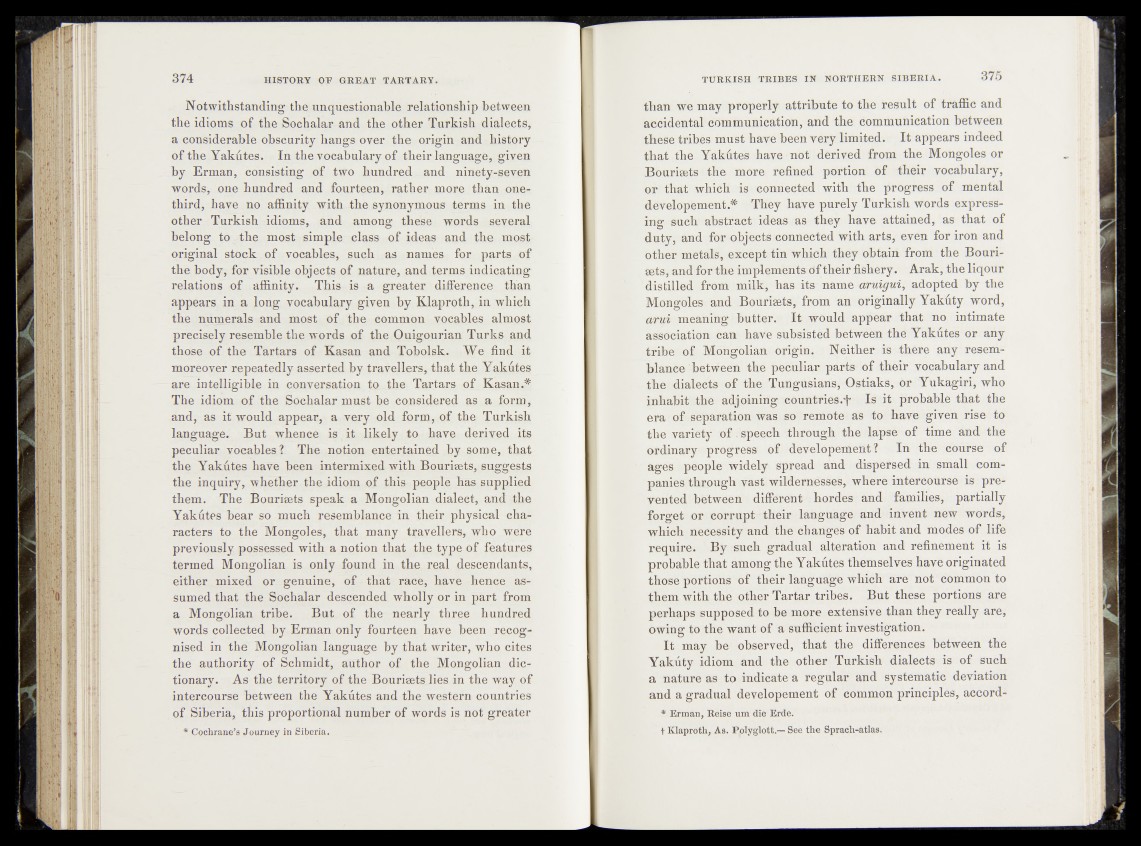
Notwithstanding the unquestionable relationship between
the idipms of the Soehalar and the other Turkish dialects,
a considerable obscurity hangs over the origin and history
of the Yakutes* In the vocabulary of their language,, given
by Erman, consisting of two hundred, and ninety-seven
words, one hundred and fourteen, rather more than one-
third, have no affinity with the synonymous terms in the
other Turkish-idioms, and among these words several
belong to the most simple class óf ideas and the'most1
original stock of vocables, such, as names for parts of
the body, for visible objects of nature, and terms indicating
relations of affinity. This is a greater' difference than
appears in a long vocabulary given by Klaproth,, jm which
the numerals and most of the common vocables, almost
precisely resemble the words of the Ouigourian Turbs- and
those of the Tartars of Kasan and Tobolsk. We find it
moreover repeatedly asserted by travellers, that the Yakdtes
are intelligible in conversation tcL the Tartars $ f . Kasan,*
The idiom of the Soehalar must be considered as a form,
and, as it would appear, a very old form, of the Turkish
language. But whence is it likely to have derived its
peculiar voeables ? The notion entertained by some, that
the Yakutes havé been intermixed with Bourisetsy suggests
the inquiry, whether the idiom of this people has supplied
them. The Bourisets speak a Mongolian dialect, and .-the
Yakutes bear so much resemblance; in their physical characters
to the Mongoles, that many travellers, who were
previously possessed with a notion that the type of features
termed Mongolian is only found in the. real descendants,
either mixed or genuine, of - that race, have -hence assumed
that the Soehalar descended wholly or in part from
a Mongolian tribe. But of the nearly three hundred
words collected by Erman only fourteen have been recognised
in the Mongolian language by that writer, who cites
thé authority of Schmidt, author of the Mongolian dictionary.
As the territory of the Bouriaets lies in the way of
intercourse between the Yakutes and the western countries
of Siberia, this proportional number of words is not greater
* Cochrane’s Journey in Siberia.
than we may properly attribute to the result of traffic and
accidental communication, and the communication between
these tribes must have been very limited. It appears indeed
that the Yakutes have not derived from the Mongoles or
Bouriaets the more refined portion of their vocabulary,
or that which is connected with the progress of mental
developèment.# They have purely Turkish words expressing
such abstract ideas as they have attained, as that of
duty, and for objects connected with arts, even for iron and
other metals, except tin which they obtain from the Bouri-
sets, and for the implements df their fishery. Arak, the liqour
distilled from milk, has its’ name aruigui, adopted by the
Mongoles and Bouriaets, from an originally Yakuty word,
arui meaning butter. It would appear that no intimate
association can have subsisted between the Yakutes or any
tribe of Mongolian, origin. Neither is thère any resemblance
between the peculiar parts of their vocabulary and
the dialects of the Tungusians, Ostiaks, or Yukagiri, who
inhabit the adjoining countries.f* Is it probable that the
era of separation'was so remote as to have given rise to
the variety of Speech through the lapse of time and the
ordinary progress of developement ? In -the course of
ages people widely spread and dispersed in small companies
through vast wildernèsses, where intercourse is prevented
between different hordes and families, partially
forget or corrupt tfieir language and invent new words,
which necessity and the changes of habit and modes of life
require. By such gradual alteration and refinement it is
probable that among the Yakfites themselves have originated
those portions of their language which are not common to
them with the other Tartar tribes. But these portions are
perhaps supposed to be more extensive than they really are,
owing to the want of a sufficient investigation.
It may be observed, that the differences between the
Yakuty idiom and the other Turkish dialects is of such
a nature as to indicate a regular and systematic deviation
and a gradual developement of common principles, accord-
* Erman, Reise urn die Erde.
t Klaproth, As. Palyglott.— See the Sprach-atlas.